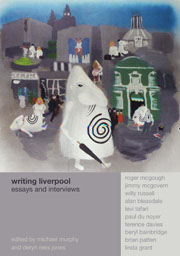Book contents
- Frontmatter
- Contents
- Acknowledgements
- List of Contributors
- Dedication
- Introduction: Sounding Liverpool
- 1 George Garrett, Merseyside Labour and the Influence of the United States
- 2 ‘No Struggle but the Home’: James Hanley's The Furys
- 3 Paradise Street Blues: Malcolm Lowry's Liverpool
- 4 ‘Unhomely Moments’: The Fictions of Beryl Bainbridge
- 5 A Man from Elsewhere: The Liminal Presence of Liverpool in the Fiction of J.G. Farrell
- 6 The Figure in the Carpet: An Interview with Terence Davies
- 7 ‘Every Time a Thing Is Possessed, It Vanishes’: The Poetry of Brian Patten
- 8 Finding a Rhyme for Alphabet Soup: An Interview with Roger McGough
- 9 Rewriting the Narrative: Liverpool Women Writers
- 10 Jumping Off: An Interview with Linda Grant
- 11 Ramsey Campbell's Haunted Liverpool
- 12 ‘We Are a City That Just Likes to Talk’: An Interview with Alan Bleasdale
- 13 ‘Culture Is Ordinary’: The Legacy of the Scottie Road and Liverpool 8 Writers
- 14 ‘I've Got a Theory about Scousers’: Jimmy McGovern and Lynda La Plante
- 15 Manners, Mores and Musicality: An Interview with Willy Russell
- 16 Subversive Dreamers: Liverpool Songwriting from the Beatles to the Zutons
- 17 Putting Down Roots: An Interview with Levi Tafari
- 18 ‘Out of Transformations’: Liverpool Poetry in the Twenty-first Century
10 - Jumping Off: An Interview with Linda Grant
- Frontmatter
- Contents
- Acknowledgements
- List of Contributors
- Dedication
- Introduction: Sounding Liverpool
- 1 George Garrett, Merseyside Labour and the Influence of the United States
- 2 ‘No Struggle but the Home’: James Hanley's The Furys
- 3 Paradise Street Blues: Malcolm Lowry's Liverpool
- 4 ‘Unhomely Moments’: The Fictions of Beryl Bainbridge
- 5 A Man from Elsewhere: The Liminal Presence of Liverpool in the Fiction of J.G. Farrell
- 6 The Figure in the Carpet: An Interview with Terence Davies
- 7 ‘Every Time a Thing Is Possessed, It Vanishes’: The Poetry of Brian Patten
- 8 Finding a Rhyme for Alphabet Soup: An Interview with Roger McGough
- 9 Rewriting the Narrative: Liverpool Women Writers
- 10 Jumping Off: An Interview with Linda Grant
- 11 Ramsey Campbell's Haunted Liverpool
- 12 ‘We Are a City That Just Likes to Talk’: An Interview with Alan Bleasdale
- 13 ‘Culture Is Ordinary’: The Legacy of the Scottie Road and Liverpool 8 Writers
- 14 ‘I've Got a Theory about Scousers’: Jimmy McGovern and Lynda La Plante
- 15 Manners, Mores and Musicality: An Interview with Willy Russell
- 16 Subversive Dreamers: Liverpool Songwriting from the Beatles to the Zutons
- 17 Putting Down Roots: An Interview with Levi Tafari
- 18 ‘Out of Transformations’: Liverpool Poetry in the Twenty-first Century
Summary
Linda Grant was born in Liverpool in 1951, the daughter of Russian and Polish Jewish immigrants. She read English at the University of York and completed an MA at McMaster University, Ontario, Canada, where she lived from 1977 to 1984. In 1985 she returned to Britain and became a journalist. Between 1995 and 2000 she was a feature writer for the Guardian, and was for five years a columnist on the Jewish Chronicle. Her first novel, The Cast Iron Shore (1996), won the David Higham Prize for Fiction and was shortlisted for the Guardian Fiction Prize. Her second, When I Lived in Modern Times (2000), set in Palestine immediately after the Second World War, won the Orange Prize for Fiction and was short-listed for the Jewish Quarterly Literary Prize for Fiction. Her novel Still Here (2002), set in Liverpool, tells the story of a middle-aged English woman and her relationship with an American architect. Her non-fiction includes Sexing the Millennium: A Political History of the Sexual Revolution (1993) and Remind Me Who I Am Again (1998), an account of her mother's dementia, which won the MIND Book of the Year/Allen Lane Award. Her most recent book is The People on the Street: A Writer's View of Israel (2006), winner of the 2006 Lettre Ulysses Award.
- Type
- Chapter
- Information
- Writing LiverpoolEssays and Interviews, pp. 160 - 165Publisher: Liverpool University PressPrint publication year: 2007



